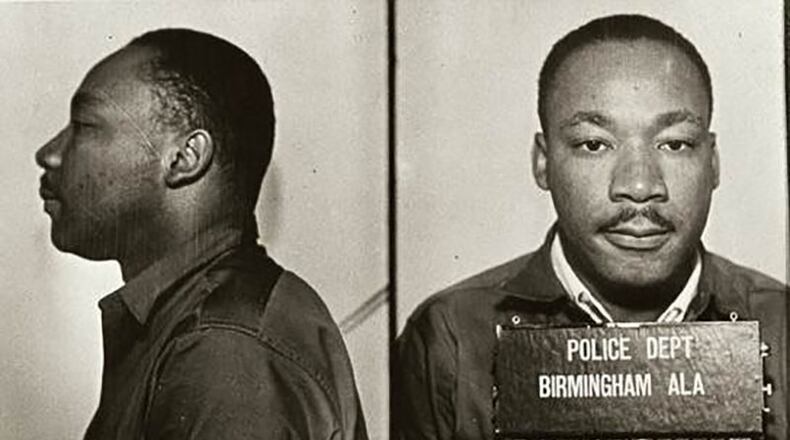“Injustice anywhere is a threat to justice everywhere.”
That sentiment from the Rev. Martin Luther King Jr.’s “Letter from Birmingham Jail” is as pertinent today as it was when he penned it 61 years ago. While many advances toward racial equity have been made since then, there is still much work to be done, and many of the points he raised in his impassioned letter resonate today.
In observation of MLK Day, a new commemorative copy of King’s “Letter from Birmingham Jail” (HarperCollins, $22.99) will be published Jan. 14 in time for the national holiday, and reading it — whether for the first time or again ― is a meaningful way to observe the occasion.
Penned in 1963, the open letter was smuggled out of prison on scraps of paper provided to King by a trusty. It was written in response to a letter from eight church leaders in Birmingham accusing King of being an outside agitator and engaging in “unwise and untimely” activities that “incite hatred and violence, however technically peaceful those actions may be.”
King wrote the letter during eight days of captivity following his arrest for “parading without a permit,” aka engaging in peaceful protest. And in it he specifically targets white moderates for being “more devoted to ‘order’ than to justice.”
Point by point, King’s letter dismantles the religious leaders’ arguments and includes a playbook for a nonviolent campaign: Collect the facts, negotiate, self-purify, take direct action.
“You deplore the demonstrations that are presently taking place in Birmingham,” King writes. “But I am sorry that your statement did not express a similar concern for the conditions that brought the demonstrations into being. … The white power structure in this city left the Negro community with no other alternative.”
King expresses disappointment with the “white church,” calling some of its members “outright opponents” to the cause, adding that “all too many others have been more cautious than courageous and have remained silent behind the anesthetizing security of the stained-glass windows.”
But he closes on a note of hope: “If the inexpressible cruelties of slavery could not stop us, the opposition we now face will surely fail.”
Credit: HarperCollins
Credit: HarperCollins
The slim, large-print book is the latest publication in “The Essential Speeches of Dr. Martin Luther King Jr.” series from HarperCollins. A deal struck in 2021 made the company the official worldwide publisher of King’s archives. It was a full circle moment: HarperCollins published King’s first book, “Stride Toward Freedom: The Montgomery Story,” in 1958.
“Letter From Birmingham Jail” includes an afterword from poet and legal scholar Reginald Dwayne Betts, who credits books for turning his life around during his incarceration for carjacking. The MacArthur Fellow founded Freedom Reads, a nonprofit that makes books available to prisoners by bringing them directly to cell blocks in beautifully crafted bookshelves. He first read “Letter From Birmingham Jail” while in solitary confinement.
“Dr. King’s letter, though directly a message to white moderates, became the message that I needed to hear, nearly 50 years later,” Betts writes.
Selecting just the right contemporary writer to pen the foreword or afterword is a significant part of HarperCollins’ mission for the series.
“Appropriate but unexpected pairings” is how publisher Judith Curr, who oversees the project, describes the selection process.
The project’s first book, a commemorative publication of King’s March on Washington speech, “I Have a Dream,” included a foreword by Amanda Gorman, the inaugural poet at President Joe Biden’s 2021 swearing-in ceremony. She recited her poem “The Hill We Climb” standing where King stood to deliver the infamous speech.
Curr’s determination to get “Letter From Birmingham Jail” in prisons led her to Betts and Freedom Reads, which she knew could facilitate her efforts. Because prisons don’t allow hardback books, the volume is being published simultaneously in paperback ― an unusual move for a publishing company.
“I like the symmetry of all of that,” Curr said, “because Dr. King had to smuggle out the letter in pieces, as you know, and now it’s back in there with Freedom Reads and with Dwayne’s letter in the back, which could not be more appropriate.”
In addition, said Clyde Ford, an adviser to Curr as director of the Martin Luther King Jr. publishing project, “By adding the insights of contemporary scholars and activists to the books published by the library, we seek to bring King’s words, insights and calls to action to a new generation of readers and concerned citizens.”
Suzanne Van Atten is a book critic and contributing editor to The Atlanta Journal-Constitution. She may be reached at Suzanne.VanAtten@ajc.com.
About the Author
Keep Reading
The Latest
Featured




